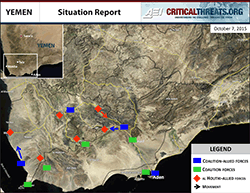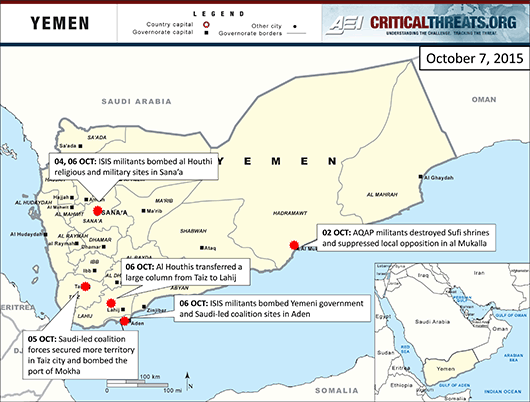The Saudi-led coalition’s recent victories in southern and northern Yemen appear to have pressured the al Houthis to accept Yemeni President Yemeni Abdu Rabbu Mansour Hadi’s preconditions for negotiations.
 |
The Saudi-led coalition strengthened its control of Taiz and Ma’rib. In Taiz, the Saudi-led coalition seized central Taiz city. The coalition also mobilized forces from Lahij to contest al Houthi positions along the Taiz-Lahij border. Coalition forces continued efforts to disrupt al Houthi maritime supply lines near Taiz by seizing islands around the Bab al Mandeb and bombing the port of Mokha on October 5. In Ma’rib, coalition forces advanced west and took control of a key juncture along the Ma’rib-Sana’a highway on October 5. Separately, UAE forces transferred troops and military equipment from Ma’rib to Hadramawt on October 5. It is unclear whether coalition forces will attempt to capitalize on local opposition to al Qaeda in the Arabian Peninsula (AQAP) to liberate al Mukalla.
The al Houthis officially accepted Hadi’s preconditions for negotiations. The al Houthis and their allies in the General People’s Congress party submitted official letters to the UN, stating their adherence to a seven-point plan proposed at talks in Muscat, Oman, last month and acceptance of the terms in UNSCR 2216, which includes complete disarmament and withdrawal from seized territories, on October 6. The group had not previously recognized UNSCR 2216 publicly.
The al Houthis secured support from Shi’a allies in preparation for an extended stalemate. Al Houthi Revolutionary Committee Chairman Mohammed Ali al Houthi asserted that the al Houthi operations would focus on attacking Saudi Arabia instead of retaking Aden in an October 1 interview with al Mayadeen News, a pro-Hezbollah news outlet in Lebanon. He also praised Russia’s active role in mediating negotiations between all parties in the Yemeni conflict. The al Houthi chairman’s interview with a Lebanese news outlet suggests that the al Houthis are attempting to recruit foreign Shi’as to support its operations in Yemen. On October 6, an al Houthi delegation met with Hezbollah leader Hassan Nasrallah in Lebanon and Iranian Supreme National Security Council Secretary Ali Shamkhani in Tehran to discuss military training programs and arms shipments. Shamkhani reaffirmed Iran’s support for the al Houthis in an October 6 statement.
The Islamic State in Iraq and al Sham’s (ISIS) series of bombings in Aden undermined Yemeni President Abdu Rabbu Mansour Hadi’s efforts to portray his government as the dominant security provider in southern Yemen. ISIS Wilayat Aden-Abyan, a new joint operations cell, claimed to have detonated four suicide vehicle-borne improvised devices near Yemeni government and Saudi-led coalition sites in Aden on October 6. Yemeni government and Saudi-led coalition spokesmen attempted to downplay the bombings’ impact to assuage local concerns about their ability to secure southern Yemen on October 7. Separately, ISIS militants attempted to inflame Sunni-Shi’a tensions in Sana’a by bombing al Houthi sites on October 4 and October 6. (Sources available upon request.)
AQAP renewed its public criticism of ISIS to compete for recruits and resources in the global jihadist movement. AQAP senior official Khalid Batarfi condemned ISIS’s mosque bombings in Yemen and accused the group of killing more Sunnis than Shi’as in an October 2 video. AQAP had not criticized ISIS in an official video since the death of anti-ISIS AQAP religious official Harith bin Ghazi al Nadhari in January. AQAP militants also conducted several military activities to consolidate control of al Mukalla from October 2 to October 5, destroying Sufi shrines and suppressing local opposition to the shrine bombings, arresting violators of shari’a law, and capturing spies accused of supporting U.S. airstrikes.
AQAP and ISIS will continue to leverage the Saudi-led coalition’s focus on the al Houthis to expand in recently liberated territories. ISIS’s direct attacks on Yemeni government and coalition sites in Aden will increase pressure on Hadi’s government to respond to the growing influence of jihadi groups.
Emily Estelle contributed to the research for this piece.
← PREVIOUS |
NEXT → |

